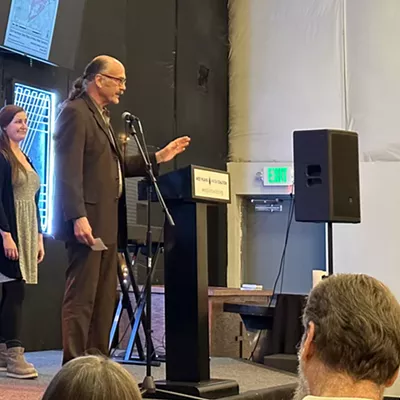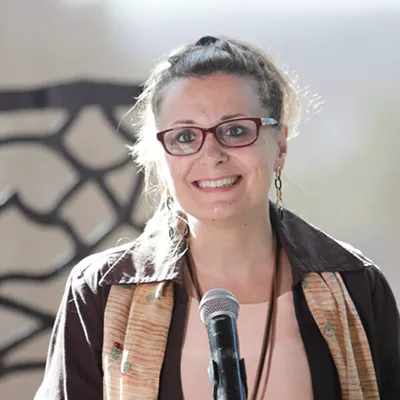Spokane's slam scene goes big-time on Saturday night at Empyrean when Solomon Sparrow's Electric Whale Tour drops in: five poets, five mikes, and verbal frenzies at close range.
Derrick Brown, Dan Leamen, Mike McGree, Anis Mojgani and Buddy Wakefield are spoken-word artists, all of them either American or international poetry slam champions, some of them performers on HBO (and yes, even NPR) or opening acts for the likes of the White Stripes and Ani DiFranco. Their performances on MySpace and YouTube suggest hip-hop flows with the emphasis shifted from the backbeat to the words.
Take Mojgani, for example, whose delivery kicks down doors and throws away the locks. Text on a page doesn't match his onstage delivery -- bouncing on his toes and poking his fingers in the air as he delivers rapid-fire chanting, drunk on metaphor like a young Allen Ginsburg, inoculating his listeners against cynicism and despair. Here are excerpts from "Direct Order":
You have just been given a direct order to rock the f*** out.
Rock out like the streets are empty except for you, your bicycle and your headphones.
Rock out like you get paid to disturb the peace.
Rock out like you got a pocketful of tokens and you got nothing to do but everything.
Rock out like your dead grandfather just came back to take a ride with you in your new car.
Rock out like Jimi has returned with brand-new guitar strings.
And on and on, with the list swirling higher and higher, like a preacher's crescendo.
In an interview with a webzine called the Common Line Project, Mogjani responds to claims that slam's emphasis on performance is meretricious, cheapening a more proper focus on the written text alone. Why the need to go past what the poet wrote? Well, says Mogjani, because poetry started in an oral tradition. And then he draws an interesting analogy: "Why didn't art stop with the fresco? Why didn't it stop with the marble? Why did people have to continue with the photographic image until it moved, why weren't they happy with capturing a still image? Because some things have to be expressed in a certain way."
Empyrean's Chrisy Riddle describes Mojgani's work as "not so much social justice, but he encourages equality. He aims at the heart."
When a slam poet like Mogjani accumulates his expressions of joy, it's infectious, like the giggles. That's why Common Line calls Mogjani "a spoken word superhero. His poems bleed pure energy into anyone who cares enough to open up and listen." Soak up some of that energy by listening to Mogjani's "Shake the Dust":
This is for the fat girls, and for their little brothers.
This is for the schoolyard wimps and the childhood bullies who tormented them.
This is for the milk-crate ballplayers and the former prom queen,
for the retired elderly Wal-Mart store front-door greeters:
Shake the dust.
This is for the bus drivers who drive a million broken hymns.
This is for the men who have to hold onto three jobs just so they can hold up their children.
This is for the midnight bike riders who are trying to fly.
This is for the 2-year-olds who cannot be understood because they speak half-English and half-God:
Shake the dust.
Compassion like that pulverizes indifference. Slam poets like Mogjani laser in on what's positive and slice away what's deadly. Follow their orders.
Solomon Sparrow's Electric Whale Tour explodes at Empyrean, 154 S. Madison St., on Saturday, Oct. 27, at 7 pm (doors at 6:30 pm). $10. Visit www.electricwhale.com or call 838-9819.














